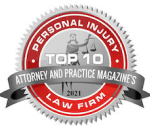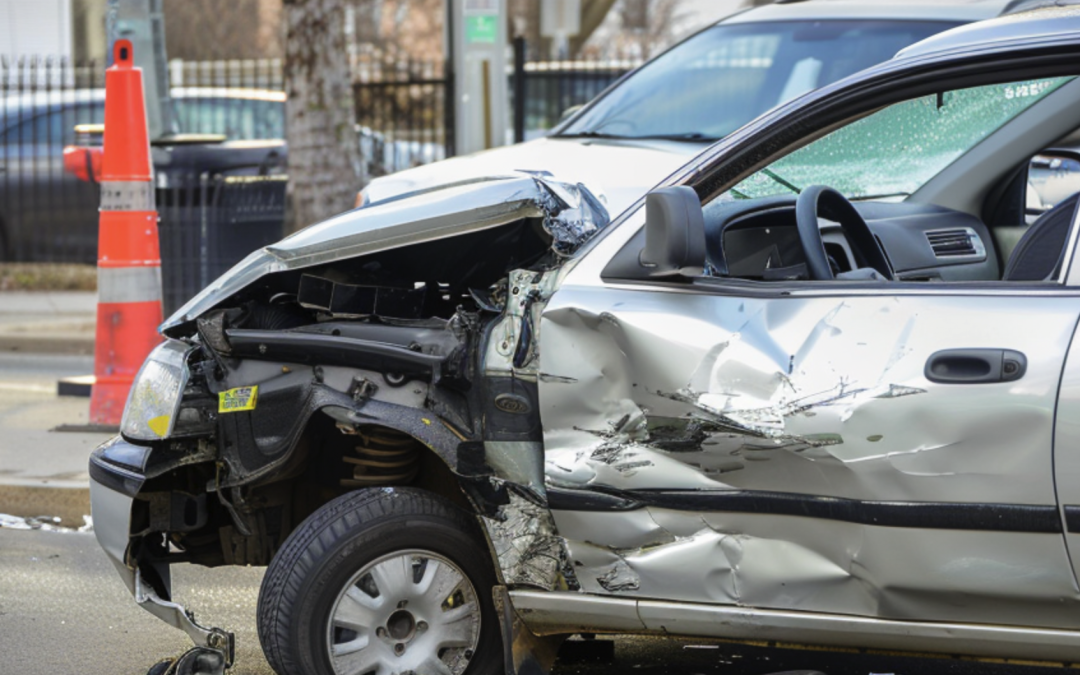After experiencing a car accident, it’s crucial to stay calm and follow key steps to protect yourself. First, ensure safety by calling 911, checking for injuries and moving to a safe location if possible.
Only then should you think about insurance and legal support, but we have all the important steps to take after an auto accident coming right up.
What to do immediately after a car accident
Immediately following a car accident, your actions are crucial, especially when the accident wasn’t your fault. Here are the essential steps to take:
1. If somebody is hurt in a car accident, call 911 immediately
Calling 911 ensures that emergency and law enforcement personnel are dispatched to the scene and accident victims can receive immediate medical assistance.
Emergency responders will then ask you for information about the accident, such as the location and if anyone is hurt. It’s important to remain calm and provide accurate information to help them respond effectively.
If anyone is critically injured, it’s important to stay with them and provide first aid until help arrives. Avoid moving the person unless it’s absolutely necessary as it may cause further harm.
If you are injured in a car accident in Connecticut, we can help
If you or a loved one has been injured in a car accident in Connecticut, you don’t have to go through this challenging time alone. It’s crucial to have a skilled and compassionate advocate on your side.
We have a Hartford personal injury lawyer who will fight tirelessly for your rights, ensuring that you receive the compensation you deserve for your injuries, lost wages, and pain and suffering.
Get in touch with us today to arrange a free consultation and learn more about how we can help you on your road to recovery.

2. Get police on the scene
In many cases, a 911 dispatch will automatically send law enforcement to the scene of an accident. However, if this doesn’t happen or you’re in a minor fender bender, it’s still important to contact the police about the accident.
As per Connecticut General Statutes § 14-108a, it’s mandatory to report any motor vehicle accident that results in significant property damage ($1000+), death or bodily injury within five days. However, an accident report can also help establish proof of fault in a claim, so it’s important to have the police at the scene to document the incident.
The report will document important details such as the date, time, and location of the accident, as well as statements from all parties involved. Make sure to obtain a copy of the accident report for your records and to use as evidence in any legal proceedings.
3. Collect as much information as you can about the accident
It may take awhile for the police and emergency responders to arrive at the scene, so while you wait, it’s essential to collect as much information about the accident as possible:
- Names and contact information of all parties involved
- Insurance information for all vehicles involved
- License plate numbers and vehicle descriptions
- Photos or videos of the accident scene and damage to vehicles
- Witness statements and contact information
Having this information will help your insurance provider process your claim and can also be valuable evidence if you need to take legal action. Remember that even if it might seem obvious that the accident wasn’t your fault, it’s still important to gather as much evidence as possible. After all, insurersand courts may require proof to support your claim.
4. Whether you were injured in an accident or not, see a doctor!
After any car accident, it’s crucial to see a doctor, even if you feel fine at the moment. Many injuries, particularly those related to the head, neck, or spine, might not be immediately apparent. Conditions like whiplash, concussions, or internal bleeding can take hours or even days to manifest noticeable symptoms.
By getting a thorough medical evaluation, you ensure that any injuries are documented from the outset. This documentation is not only vital for your health but can also be crucial in any legal action or insurance claims related to the accident. It establishes a clear link between the accident and your injuries, which is essential when seeking compensation.
5. Contact your insurer
After seeking medical treatment and gathering information at the scene, it’s important to contact your insurer as soon as possible. Even if the accident wasn’t your fault, you still need to report it. Check your auto insurance policy to see what is covered and what steps you need to take.
Timeframes can vary, but most companies require that you report an accident within 24 hours. Failure to do so could result in a fine or denial of your insurance coverage, even if the accident was not your fault.
Be sure to provide all the information you have gathered, including photos, witness statements, and police reports. This will help expedite the claims process and ensure that you receive proper compensation for any damages or injuries.
What to do after a car accident injury
In addition to the above steps, if you’ve been injured in a car accident that wasn’t your fault, taking the right steps afterwards is crucial for your health and legal rights. Here’s what you need to know:
1. Get a complete medical examination
Even though you may have already seen a doctor at the scene of the accident, it’s still essential to get a complete medical examination as soon as possible. Some injuries may not show symptoms immediately, and others may worsen over time if left untreated.
Getting a thorough evaluation from a medical professional ensures that all injuries are documented and treated promptly, reducing the risk of complications down the line. This also provides important evidence for any legal proceedings or insurance claims related to the accident.
Physical recovery may extend beyond rest, with treatments like physical therapy and chiropractic care playing key roles in rehabilitating the body, alleviating pain, and restoring mobility. These treatments, recommended by medical professionals, are integral to improving recovery outcomes.
It’s also important to address not only physical injuries but also the mental and emotional impact, such as PTSD, anxiety, and a fear of driving. Recognizing symptoms like nightmares and severe anxiety is crucial, and seeking professional mental health support through therapies like CBT (cognitive-behavioral therapy) can aid in recovery.
2. Get help from an experienced car accident attorney
After a car accident, dealing with injuries and navigating the complex legal and insurance landscape can be overwhelming. This is where a skilled car accident lawyer can make a significant difference. With a knowledgeable attorney by your side, you can focus on your recovery while we handle the legal intricacies.
An experienced attorney can help negotiate with insurers, and if necessary, fight for your rights in court to ensure you get the compensation you deserve. Remember, insurance companies are adept at minimizing claims, so it’s essential to have someone on your side who understands the system and can help you navigate it successfully.
You may have have doubts about whether it’s worth hiring an attorney for a car accident claim. However, keep in mind that as personal injury lawyers, we work on a contingency basis, meaning you only pay legal fees if we win your case. This means there is no financial risk involved for you.
Additional reading: Is it worth hiring an attorney for a car accident

3. Stay organized and keep records
This includes keeping track of all medical bills, documenting time off work due to injuries, and any other related expenses.
Having accurate records will not only help you keep track of your expenses, but it also provides evidence to support your claim and ensures you are fully compensated for all damages. Remember to also communicate regularly with your attorney and insurance company to stay updated on the progress of your case.
Follow-up tasks after a car accident
Recovering from a car accident involves several critical steps, each designed to protect your health, safeguard your legal rights, and ensure you receive the compensation you’re entitled to. Navigating the aftermath of an accident can feel overwhelming, but by following a methodical approach, you can manage the situation more effectively.
Here are the key actions you should and shouldn’t do:
- Do: Secure a copy of the police report for your records.
- Do: Collect all possible information at the scene, including contact and insurance details of all involved parties, vehicle descriptions, and photos of the scene and damage.
- Do: Seek medical attention immediately, even if no injuries are apparent. Some injuries can be latent and symptoms may appear later.
- Do: Contact your insurance company to report the accident within the specified timeframe.
- Do: Consider consulting with a professional car accident attorney, especially if you’ve sustained injuries.
- Do: Keep meticulous records of all medical treatments, expenses, and any lost wages due to the accident.
- Do: Stay in regular communication with your attorney and insurance adjuster to stay informed about the status of your claim.
These are the pitfalls to avoid:
- Don’t: Admit fault at the accident scene. Statements made can be used against you in legal and insurance proceedings.
- Don’t: Delay medical evaluations or treatment, as this could jeopardize both your health and potential compensation.
- Don’t: Post details or discuss the accident on social media platforms. Such posts can be used by insurance companies or in court
Is Connecticut a no-fault state for car accidents?
Connecticut used to be a no-fault state for car accidents, meaning that drivers had to turn to their own insurers to cover accident-related expenses, regardless of who caused the accident. However, in 1994, Connecticut changed its laws (Repeal of Auto No-Fault Insurance) and became a fault-based state.
This means that the at-fault driver is financially liable for any damages or injuries resulting from the accident. And so, if you’ve been injured in a car accident in Connecticut, you can file a claim with the at-fault driver’s insurance company to seek compensation for your injuries and damages.
Note that their insurer may still try to minimize your claim or deny it altogether. In such cases, having a skilled car accident attorney on your side can make a significant difference in securing fair compensation.
Additional reading: how much can someone sue for a car accident
The legal process after your accident
The timeline and actions for filing a claim provides a framework that can help you manage expectations and prepare for what lies ahead.
- File a Personal Injury Claim: File immediately after the accident with the at-fault party’s insurance. Do this as soon as possible, ideally within days after the accident.
- Insurance Investigation: The insurance company investigates the accident, which can take weeks. This includes reviewing the police report, interviewing witnesses, and assessing damages.
- Demand Letter: After treatment, your attorney sends a demand letter with details of your injuries, treatment, and the compensation sought. This process can vary in time.
- Settlement Negotiations: Negotiations between your attorney and the insurance could last weeks to months, aiming for a fair settlement without trial.
- Filing a Lawsuit: If no settlement is reached, a lawsuit is filed before the Connecticut car accident statute of limitations expires, typically 2 years from when the accident happened.
- Discovery Phase: Post-lawsuit, parties exchange information in the discovery phase, lasting 6 months to a year to investigate claims and defenses.
- Mediation and Negotiation: Often before trial, parties may engage in mediation or further negotiations, which could lead to a settlement in weeks to months.
- Trial: Without a settlement, the case goes to trial, which could last from a day to several weeks based on case complexity.
- Judgement or Settlement: After trial, a judgment is issued, but settlements can occur anytime before the final verdict.
As for the overall timeframe, the legal process ranges from months to years, typically resolving within 9 to 18 months.
How we’ve helped victims after accidents that weren’t their fault
We pride ourselves on the positive feedback and heartfelt testimonials from those we’ve had the privilege to represent. Our dedication to each case and personal attention to every detail do not go unnoticed by our clients.
Here are some stories from individuals who reached out to us recently in their times of need:
- On March 25, 2024, Michael Foley reached out to Attorney Chambers regarding a medical issue, seeking advice on a potential malpractice lawsuit. Foley praised Chambers for his exceptional patience, clear explanations, and polite demeanor, noting that even though Chambers couldn’t take the case, he thoroughly clarified the situation.
- Jeremiah Eernisse, on March 21, 2024, mentioned that despite his case not being taken up, he was grateful for the time spent listening to his concerns.
- Vanessa Castrogiovanni, on March 10, 2024, commended Michael Chambers for his excellent legal services. She highlighted his expertise, dedication, and the personal attention he provided throughout her case, highly recommending him for his commitment to achieving the best outcomes.
- Geraldine (last name withheld) expressed her extreme satisfaction with the outcome of her settlement on March 4, 2024. She thanked Attorney Chambers and his team for their invaluable assistance, describing them as the best in their field.
Each of these testimonials speaks to our commitment to excellence, empathy, and effectiveness in navigating the complexities of legal disputes. Our aim is not only to win cases but to ensure that every person who seeks our help feels heard, valued, and supported throughout their legal journey.
Additional reading: average car accident settlement in Connecticut
I was hurt in a car accident, can you help?
We’d love to!
If you’ve been injured in a car accident and are feeling overwhelmed by the legal process, don’t face it alone. Contact a skilled Hartford car accident lawyer who can guide you every step of the way. Our expertise in managing car accident claims means we understand exactly what it takes to fight for the compensation you deserve.
Call us today at (860) 231-9535 or fill out our contact form to arrange a free consultation. Your path to recovery starts with a single step, and that step is reaching out to our dedicated team.

Our key takeaways
First and foremost, prioritize your health by seeking immediate medical attention, not just for the sake of your recovery but also to document your injuries in connection to the accident. This medical documentation is crucial, serving as tangible evidence that bolsters your claim.
Equally important is the manner in which you handle communications with insurance companies. While it might seem intuitive to provide them with all the details of the accident and your injuries, such disclosures can inadvertently jeopardize your claim. Insurance companies, driven by profit motives, often employ strategies to minimize payouts. This is where the expertise of a seasoned car accident attorney becomes invaluable.
An attorney can adeptly manage all interactions with insurance adjusters, ensuring that your claim is presented in the strongest possible light. By securing legal representation early, you place yourself in the best position to navigate the complexities of insurance claims, allowing you to focus on your recovery while your lawyer champions your cause for fair compensation.
Additional reading: who pays for medical bills after a car accident
FAQs
How should I document injuries and damages at the scene?
Take clear photos of all injuries, vehicle damages, and the accident scene from multiple angles. Also, gather witness contact information and ensure a police report is filed, as it serves as an official record of the incident.
How do I deal with insurance companies after an accident that's not my fault?
When dealing with insurance after an accident, it’s crucial to communicate carefully. Provide necessary information without admitting fault or speculating about the accident’s details. Consider consulting with a lawyer to ensure your rights are protected and to help negotiate any settlement offers or compensation claims.
Should I seek medical attention even if I don’t feel injured?
Yes, it’s vital to seek medical attention immediately after an accident, even if you don’t feel injured. Some injuries, like whiplash or internal trauma, may not show symptoms right away but can have long-term impacts. A medical evaluation provides an essential record of your health post-accident.
How can I ensure I receive fair compensation for my damages?
To ensure fair compensation for your damages, it’s crucial to document everything, seek medical evaluation, and consult with an experienced car accident lawyer. A personal injury lawyer can accurately assess your case, negotiate with insurers, and if necessary, represent you in court to secure the compensation you deserve.
What should I do if the other driver’s insurance company offers a settlement?
If the other driver’s insurance company offers a settlement, it’s imperative to consult with your attorney before accepting. Your lawyer can evaluate if the offer aligns with your damages and injuries to ensure you receive adequate compensation. Accepting without legal advice might result in settling for less than you deserve.

